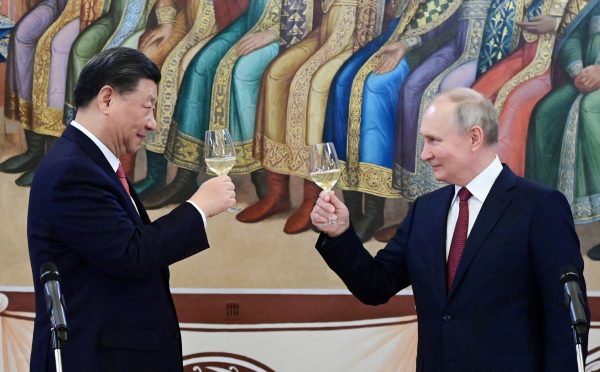Europeans scoffed when Donald Trump called them “delinquent” on their contributions to NATO — it made the Atlantic Alliance, based on hallowed values and shared sacrifice over many decades, sound like a protection racket. But the previous (and perhaps next) American president had a point. National security is like an insurance policy: for risks we cannot afford to bear, paying a little saves a lot. Miss the premium, and you lose the coverage.
National security insurance is a good deal for the Europeans. The Americans lead the alliance and take care of the nuclear weapons, military space programs, long-range strikes, war-fighting stocks, and other costly capabilities that make deterrence credible. In return, the Europeans are supposed to spend 2% of GDP on defense and to offer support on big global issues. But the policy is lapsing. For years Europeans put other interests (notably: cheap Russian gas and low-cost manufacturing in China) ahead of national security. They scrimped on defense. Though that is changing, a big slice of American voters is now fed up with European free-riders, Worse, China is now the number one threat; Europe is a sideshow.
On paper, Europeans could defend themselves. European NATO members’ GDP is around $20 trillion (The US national income is $23 trillion). But even assuming the necessary political will, turning cash into military clout takes time. Doing 1,440 press-ups in a day (one a minute) is merely exhausting. Spreading the same number over a few weeks has a big effect on fitness. So even under the most unrealistically optimistic assumptions, it would take the Europeans at least a decade to replace the US security umbrella. Russia, unless it completely disintegrates following a defeat in Ukraine, could reconstitute its army and pose a severe challenge within two years.
The urgent task for the Europeans, therefore, is to share the burden better at home and make themselves more useful to the United States elsewhere, chiefly on China. The EU’s economic heft, rule-making powers, and diplomatic clout are important, perhaps crucial, assets here, because the rivalry is not only military. The Chinese party-state is fighting for dominance in arenas such as control of personal data, information flows, and setting technological standards. Transatlantic and transpacific cooperation between the US and its allies can work: just look at how it broke Huawei’s seemingly inexorable grip on 5G telephony. Next up: critical minerals, chips, and drones.
This means a big rethink. Our political and economic model has for three decades involved businesses prioritizing returns to shareholders, rather than national security. We need, in effect, a new kind of political risk insurance, mitigating not specific disruptions (war, nationalization) but potential threats to the supply chain, and the danger of leaking data and sensitive technologies. We did this during the Cold War. We need to learn to do it again.
The national security insurance policy has two more elements: public trust and social cohesion. These are vulnerable to external mischief-makers (Russia has specialized in polarizing opinion), or they may erode because of economic, cultural, and other woes. True, the arguments for outsourcing, mass migration, and skinnier public services can be strong. New technology, climate change, and other big trends make wrenching changes inevitable. But the people who don’t like all this can vote. When ignored, they may express their discontent by choosing anti-systemic “populist” politicians, or by supporting supposedly anti-establishment causes such as Brexit. Dismissing these voters as traitors, bigots, or idiots compounds their alienation. That this afflicts the United States as well as Europe only highlights the national security consequences. Assuaging these sentiments will be costly, but ignoring them will be catastrophic.
Europe’s Edge is CEPA’s online journal covering critical topics on the foreign policy docket across Europe and North America. All opinions are those of the author and do not necessarily represent the position or views of the institutions they represent or the Center for European Policy Analysis.





